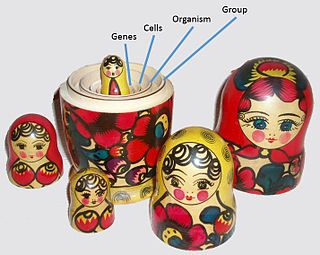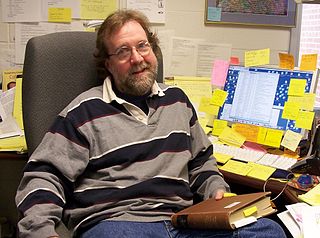Related Research Articles

Evolutionary psychology is a theoretical approach in psychology that examines cognition and behavior from a modern evolutionary perspective. It seeks to identify human psychological adaptations with regards to the ancestral problems they evolved to solve. In this framework, psychological traits and mechanisms are either functional products of natural and sexual selection or non-adaptive by-products of other adaptive traits.

Neo-Darwinism is generally used to describe any integration of Charles Darwin's theory of evolution by natural selection with Gregor Mendel's theory of genetics. It mostly refers to evolutionary theory from either 1895 or 1942, but it can mean any new Darwinian- and Mendelian-based theory, such as the current evolutionary theory.

August Friedrich Leopold Weismann FRS (For), HonFRSE, LLD was a German evolutionary biologist. Fellow German Ernst Mayr ranked him as the second most notable evolutionary theorist of the 19th century, after Charles Darwin. Weismann became the Director of the Zoological Institute and the first Professor of Zoology at Freiburg.
Biological determinism, also known as genetic determinism, is the belief that human behaviour is directly controlled by an individual's genes or some component of their physiology, generally at the expense of the role of the environment, whether in embryonic development or in learning. Genetic reductionism is a similar concept, but it is distinct from genetic determinism in that the former refers to the level of understanding, while the latter refers to the supposedly causal role of genes. Biological determinism has been associated with movements in science and society including eugenics, scientific racism, and the debates around the heritability of IQ, the basis of sexual orientation, and sociobiology.

The modern synthesis was the early 20th-century synthesis of Charles Darwin's theory of evolution and Gregor Mendel's ideas on heredity into a joint mathematical framework. Julian Huxley coined the term in his 1942 book, Evolution: The Modern Synthesis.

Lamarckism, also known as Lamarckian inheritance or neo-Lamarckism, is the notion that an organism can pass on to its offspring physical characteristics that the parent organism acquired through use or disuse during its lifetime. It is also called the inheritance of acquired characteristics or more recently soft inheritance. The idea is named after the French zoologist Jean-Baptiste Lamarck (1744–1829), who incorporated the classical era theory of soft inheritance into his theory of evolution as a supplement to his concept of orthogenesis, a drive towards complexity.

In computer science, evolutionary computation is a family of algorithms for global optimization inspired by biological evolution, and the subfield of artificial intelligence and soft computing studying these algorithms. In technical terms, they are a family of population-based trial and error problem solvers with a metaheuristic or stochastic optimization character.

The history of biology traces the study of the living world from ancient to modern times. Although the concept of biology as a single coherent field arose in the 19th century, the biological sciences emerged from traditions of medicine and natural history reaching back to Ayurveda, ancient Egyptian medicine and the works of Aristotle and Galen in the ancient Greco-Roman world. This ancient work was further developed in the Middle Ages by Muslim physicians and scholars such as Avicenna. During the European Renaissance and early modern period, biological thought was revolutionized in Europe by a renewed interest in empiricism and the discovery of many novel organisms. Prominent in this movement were Vesalius and Harvey, who used experimentation and careful observation in physiology, and naturalists such as Linnaeus and Buffon who began to classify the diversity of life and the fossil record, as well as the development and behavior of organisms. Antonie van Leeuwenhoek revealed by means of microscopy the previously unknown world of microorganisms, laying the groundwork for cell theory. The growing importance of natural theology, partly a response to the rise of mechanical philosophy, encouraged the growth of natural history.

In biology and genetics, the germline is the population of a multicellular organism's cells that pass on their genetic material to the progeny (offspring). In other words, they are the cells that form the egg, sperm and the fertilised egg. They are usually differentiated to perform this function and segregated in a specific place away from other bodily cells.
Mathematical and theoretical biology, or biomathematics, is a branch of biology which employs theoretical analysis, mathematical models and abstractions of the living organisms to investigate the principles that govern the structure, development and behavior of the systems, as opposed to experimental biology which deals with the conduction of experiments to prove and validate the scientific theories. The field is sometimes called mathematical biology or biomathematics to stress the mathematical side, or theoretical biology to stress the biological side. Theoretical biology focuses more on the development of theoretical principles for biology while mathematical biology focuses on the use of mathematical tools to study biological systems, even though the two terms are sometimes interchanged.

In evolutionary biology, the Baldwin effect, a phenotype-first theory of evolution, describes the effect of learned behaviour on evolution. James Mark Baldwin and others suggested during the eclipse of Darwinism in the late 19th century that an organism's ability to learn new behaviours will affect its reproductive success and will therefore have an effect on the genetic makeup of its species through natural selection. Though this process appears similar to Lamarckism, that view proposes that living things inherited their parents' acquired characteristics. The Baldwin effect has been independently proposed several times, and today it is generally recognized as part of the modern synthesis.

Orthogenesis, also known as orthogenetic evolution, progressive evolution, evolutionary progress, or progressionism, is an obsolete biological hypothesis that organisms have an innate tendency to evolve in a definite direction towards some goal (teleology) due to some internal mechanism or "driving force". According to the theory, the largest-scale trends in evolution have an absolute goal such as increasing biological complexity. Prominent historical figures who have championed some form of evolutionary progress include Jean-Baptiste Lamarck, Pierre Teilhard de Chardin, and Henri Bergson.

A unit of selection is a biological entity within the hierarchy of biological organization that is subject to natural selection. There is debate among evolutionary biologists about the extent to which evolution has been shaped by selective pressures acting at these different levels.
Dioecy is a characteristic of certain species that have distinct unisexual individuals, each producing either male or female gametes, either directly or indirectly. Dioecious reproduction is biparental reproduction. Dioecy has costs, since only about half the population directly produces offspring. It is one method for excluding self-fertilization and promoting allogamy (outcrossing), and thus tends to reduce the expression of recessive deleterious mutations present in a population. Plants have several other methods of preventing self-fertilization including, for example, dichogamy, herkogamy, and self-incompatibility.

Sean B. Carroll is an American evolutionary developmental biologist, author, educator and executive producer. He is a distinguished university professor at the University of Maryland and professor emeritus of molecular biology and genetics at the University of Wisconsin–Madison. His studies focus on the evolution of cis-regulatory elements in the regulation of gene expression in the context of biological development, using Drosophila as a model system. He is a member of the National Academy of Sciences, of the American Philosophical Society (2007), of the American Academy of Arts and Sciences and the American Association for Advancement of Science. He is a Howard Hughes Medical Institute investigator.

Paleobiology is an interdisciplinary field that combines the methods and findings found in both the earth sciences and the life sciences. Paleobiology is not to be confused with geobiology, which focuses more on the interactions between the biosphere and the physical Earth.
John Tyler Bonner was an American biologist who was a professor in the Department of Ecology and Evolutionary Biology at Princeton University. He was a pioneer in the use of cellular slime molds to understand evolution and development over a career of 40 years and was one of the world's leading experts on cellular slime moulds. Arizona State University says that the establishment and growth of developmental-evolutionary biology owes a great debt to the work of Bonner's studies. His work is highly readable and unusually clearly written and his contributions have made many complicated ideas of biology accessible to a wide audience.

Biology is the scientific study of life. It is a natural science with a broad scope but has several unifying themes that tie it together as a single, coherent field. For instance, all organisms are made up of cells that process hereditary information encoded in genes, which can be transmitted to future generations. Another major theme is evolution, which explains the unity and diversity of life. Energy processing is also important to life as it allows organisms to move, grow, and reproduce. Finally, all organisms are able to regulate their own internal environments.
Jon Allen Seger is an American evolutionary ecologist, and Distinguished Professor of Biology at the University of Utah. He helped develop the theory of bet-hedging in biology. His work has appeared in leading scientific journals such as Nature, Science, Nature Genetics, Molecular Biology and Evolution, Journal of Evolutionary Biology, as well as popular magazines such as Scientific American.

Alternatives to Darwinian evolution have been proposed by scholars investigating biology to explain signs of evolution and the relatedness of different groups of living things. The alternatives in question do not deny that evolutionary changes over time are the origin of the diversity of life, nor that the organisms alive today share a common ancestor from the distant past ; rather, they propose alternative mechanisms of evolutionary change over time, arguing against mutations acted on by natural selection as the most important driver of evolutionary change.